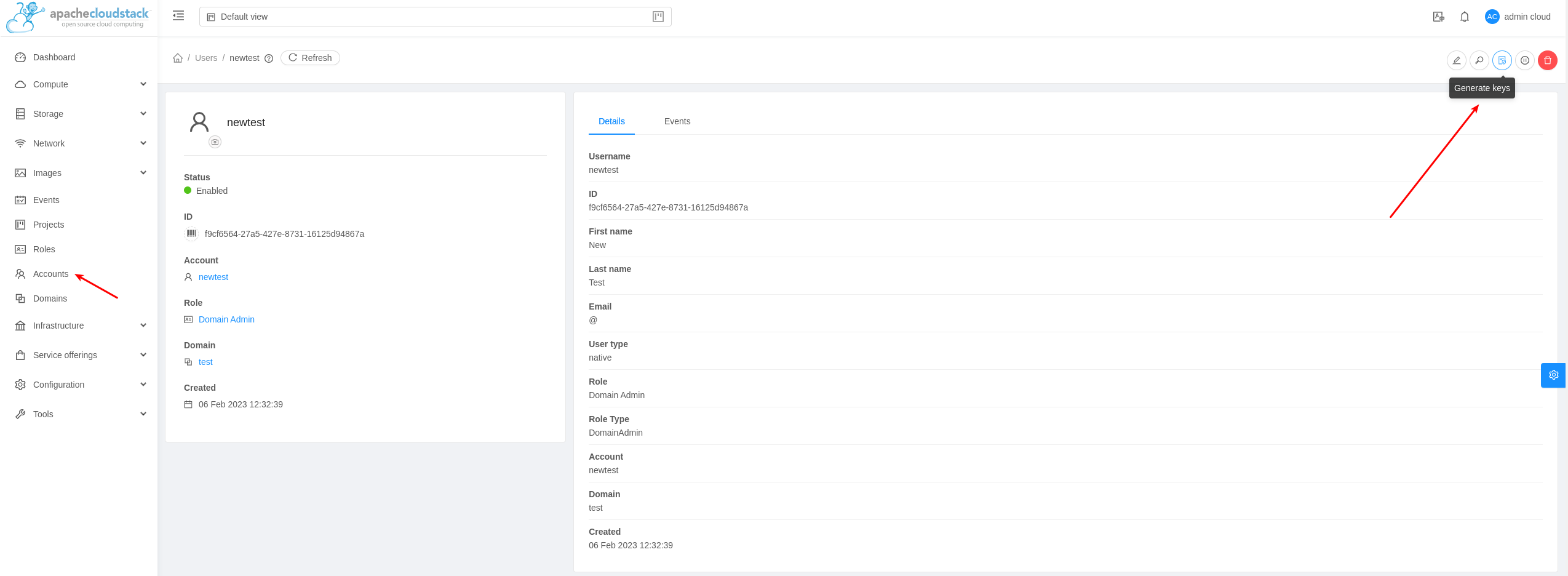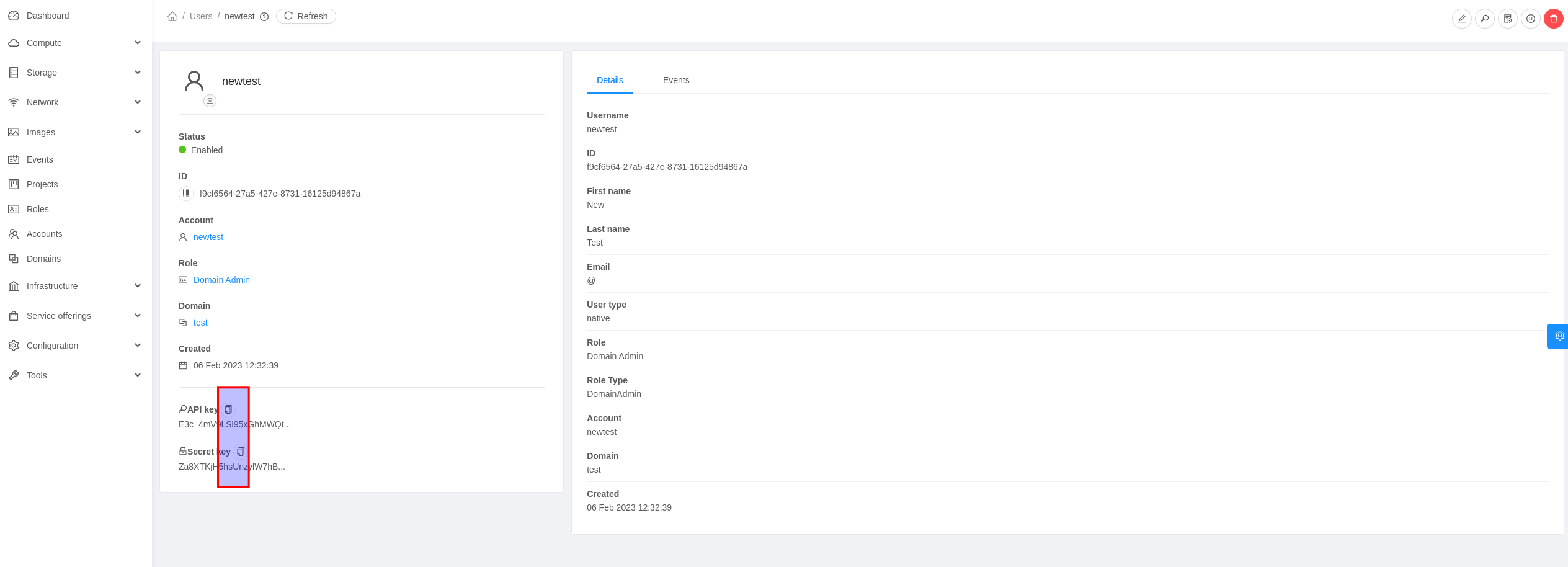Apache CloudStack - API
The CloudStack programmer guide is the reference guide on how to create API requests and how to interpret resulting the responses. Programming against the API requires familiarity with HTTP GET/POST methods, query strings, and either XML or JSON and how to generate those in the programming language of your choice.
In addition to programming requests and custom integration, the API is also used by a number of cloud infrastructure management, provisioning, and orchestration tools, and it can even be accessed from a command line. Examples of those include:
- Ansible, with the help of the Python CS library, has native CloudStack support
- SaltStack has native Apache CloudStack CloudStack support
- CMK (Cloudmonkey) is a front-end to the API that offers both an interactive shell and a command line tool that allows you to quickly get started with automation without the need for programming and Leaseweb engineers.
API endpoint URLs
The API endpoints are specific for each data center location from which Leaseweb offers Apache CloudStack Elastic Compute.
Currently available are:
| Data Center location | API URL | Service |
|---|---|---|
| AMS-01 (Amsterdam) | Elastic Compute Premium | |
| AMS-01 (Amsterdam) | https://csrp07nl.leaseweb.com/client/api | Elastic Compute |
| AMS-01 (Amsterdam) | https://csrp08nl.leaseweb.com/client/api | Elastic Compute Premium |
| FRA-01 (Frankfurt) | Elastic Compute Premium | |
| WDC-02 (Washington D.C.) | Elastic Compute Premium | |
| WDC-02 (Washington D.C.) | Elastic Compute | |
| SIN-01 (Singapore) | Elastic Compute Premium | |
| LON-01 (UK) | https://csrp06uk.leaseweb.com/client/api | Elastic Compute Premium |
| MTL-02 (CA) | https://csrp10ca.leaseweb.com/client/api | Elastic Compute |
Set up API access
To use the API, a domain administrator will need to associate a user account with a generated key pair containing both an API and the Secret Key.
It is strongly recommended that the domain administrator doesn't use the account Leaseweb provided for API access and will create additional CloudStack accounts first. Once the additional account(s) have been created, the domain administrator can use the web interface and the menu Accounts → your-domain → Users → Account Name to generate a new API and Secret Key pair for that Account. The Account type Domain Administrator or User determines which API functionality will be available.
CloudStack will generate a unique key pair with both a Secret and an API key.
The clipboard icon next to the Secret Key and API Key should be used to select the keys for copying because the web interface won’t display the complete key and selecting the key with a mouse may otherwise result in missing characters.
Install cloudmonkey - cmk
Cloudmonkey - cmk is a front-end to the API that offers both an interactive shell and a command line tool that allows you to quickly get started with automation, without the need for programming.
The original cloudmonkey was written in Python but starting from version 6.0.0, the modern cloudmonkey cmk is a fast and simplified Go-port of the original tool with some backward incompatibilities and a reduced feature set. It ships as a standalone 64-bit executable binary for several platforms such as Linux, Mac, and Windows.
For more information on cloudmonkey and to get binary please visit the link cloudstack-cloudmonkey.
Install on Linux and Mac OSX
Download the binary for Linux or Mac based on your platform and move it to a directory that is on $PATH such as /usr/local/bin.
For example, we are downloading cmk version 6.2.0 for X86-64 platform:
sudo wget https://github.com/apache/cloudstack-cloudmonkey/releases/download/6.2.0/cmk.linux.x86-64 -O /usr/local/bin/cmk sudo chmod +x /usr/local/bin/cmk
Configure cloudmonkey for first use
The default server profile has the name localcloud with defaults (such as URL and credentials) set to a locally running CloudStack server. Start cmk, create a new server profile, configure your CloudStack server's API endpoint and run sync, for example:
Before cloudmonkey can be used, it needs to be configured with the correct settings and credentials.
We start by launching cloudmonkey from a terminal prompt, and from the interactive cloudmonkey shell, creating a profile named “LeaseWeb” with default values.
~> cmk Apache CloudStack CloudMonkey 6.2.0 Report issues: https://github.com/apache/cloudstack-cloudmonkey/issues (LeaseWeb) > set profile LeaseWeb Loaded in-built API cache. Failed to read API cache, please run 'sync'. Loaded server profile: LeaseWeb Url: http://localhost:8080/client/api Username: admin Domain: / API Key: Total APIs: 590
Then update the default values with the correct settings and personal keys to manage the private cloud:
(LeaseWeb) > set username your-username (LeaseWeb) > set domain your-domain (LeaseWeb) > set apikey 1234567890abcdefghijklmnopQWERTYASDFGHJJJ (LeaseWeb) > set url https://csrp01nl.leaseweb.com/client/api (LeaseWeb) > set secretkey 0987654321ponmlkkihgfedcbaSECRETHHHHGF
The URL depends on which data center is hosting the private cloud and can be found in the table at the top of this page.
You can also use the set command to set the various server profile-specific options. The cloudmonkey configuration is stored on ~/.cmk/config file. The ~/.cmk directory also contains the API cache at ~/.cmk/profiles.
(LeaseWeb) > sync Discovered 610 APIs
Using cloudmonkey
Cloudmkonkey can be used as an interactive shell with autocomplete and history functionality by starting it from the command line:
$ cmk (LeaseWeb) > list users count = 2 user: +--------------+---------+--------------------------------------+-----------+--------------------------+----------+----------------------------------------------------------------------------------------+---------+--------------------------------+----------------------------------------------------------------------------------------+---------------------+---------+-------------+------------------+--------------------------------------+-----------+--------------------------------------+ | username | account | domainid | firstname | created | lastname | apikey | domain | email | secretkey | iscallerchilddomain | state | accounttype | timezone | id | isdefault | accountid | +--------------+---------+--------------------------------------+-----------+--------------------------+----------+----------------------------------------------------------------------------------------+---------+--------------------------------+----------------------------------------------------------------------------------------+---------------------+---------+-------------+------------------+--------------------------------------+-----------+--------------------------------------+ | LSW | LSW | e7de501e-c5c7-460c-8063-d1ac82154dd1 | Leaseweb | 2015-10-27T13:42:48+0100 | Test | apikey-1234567890-abcdefghijklmnopqrstuvwxyz-9876543210-ABCDEFGHIJKLMNOPQRSTUWXYZ-xxyz | LSWxxxx | cloudstack@leaseweb.tld | secretkey-1234567890-xxxxxxxxxxxxxxxxxxxxxxxxxxxxxxxxxxxxxxxxxxxxxxxxxxxxxxxxxxxxxxxxx | False | enabled | 2 | | 80b23484-2573-4ce4-b7c6-145be7c34426 | False | a6acf153-6522-4c86-9b24-559ed50cfedc | | john.doe | LSW | e7de501e-c5c7-460c-8063-d1ac82154dd1 | John | 2017-10-31T09:43:33+0100 | Doe | apikey-1234567890-abcdefghijklmnopqrstuvwxyz-9876543210-ABCDEFGHIJKLMNOPQRSTUWXYZ-xxxx | LSWxxxx | john.doe@global.example.tld | secretkey-1234567890-xxxxxxxxxxxxxxxxxxxxxxxxxxxxxxxxxxxxxxxxxxxxxxxxxxxxxxxxxxxxxxxxx | False | enabled | 2 | | 433ec38f-d6e5-4351-b0c7-3fee9e5e11b4 | False | a6acf153-6522-4c86-9b24-559ed50cfedc | +--------------+---------+--------------------------------------+-----------+--------------------------+----------+----------------------------------------------------------------------------------------+---------+--------------------------------+----------------------------------------------------------------------------------------+---------------------+---------+-------------+------------------+--------------------------------------+-----------+--------------------------------------+ (LeaseWeb) >
Alternatively use it as a command line utility:
$ cmk list users count = 2 user: +--------------+---------+--------------------------------------+-----------+--------------------------+----------+----------------------------------------------------------------------------------------+---------+--------------------------------+----------------------------------------------------------------------------------------+---------------------+---------+-------------+------------------+--------------------------------------+-----------+--------------------------------------+ | username | account | domainid | firstname | created | lastname | apikey | domain | email | secretkey | iscallerchilddomain | state | accounttype | timezone | id | isdefault | accountid | +--------------+---------+--------------------------------------+-----------+--------------------------+----------+----------------------------------------------------------------------------------------+---------+--------------------------------+----------------------------------------------------------------------------------------+---------------------+---------+-------------+------------------+--------------------------------------+-----------+--------------------------------------+ | LSW | LSW | e7de501e-c5c7-460c-8063-d1ac82154dd1 | Leaseweb | 2015-10-27T13:42:48+0100 | Test | apikey-1234567890-abcdefghijklmnopqrstuvwxyz-9876543210-ABCDEFGHIJKLMNOPQRSTUWXYZ-xxyz | LSWxxxx | cloudstack@leaseweb.tld | secretkey-1234567890-xxxxxxxxxxxxxxxxxxxxxxxxxxxxxxxxxxxxxxxxxxxxxxxxxxxxxxxxxxxxxxxxx | False | enabled | 2 | | 80b23484-2573-4ce4-b7c6-145be7c34426 | False | a6acf153-6522-4c86-9b24-559ed50cfedc | | john.doe | LSW | e7de501e-c5c7-460c-8063-d1ac82154dd1 | John | 2017-10-31T09:43:33+0100 | Doe | apikey-1234567890-abcdefghijklmnopqrstuvwxyz-9876543210-ABCDEFGHIJKLMNOPQRSTUWXYZ-xxxx | LSWxxxx | john.doe@global.example.tld | secretkey-1234567890-xxxxxxxxxxxxxxxxxxxxxxxxxxxxxxxxxxxxxxxxxxxxxxxxxxxxxxxxxxxxxxxxx | False | enabled | 2 | | 433ec38f-d6e5-4351-b0c7-3fee9e5e11b4 | False | a6acf153-6522-4c86-9b24-559ed50cfedc | +--------------+---------+--------------------------------------+-----------+--------------------------+----------+----------------------------------------------------------------------------------------+---------+--------------------------------+----------------------------------------------------------------------------------------+---------------------+---------+-------------+------------------+--------------------------------------+-----------+--------------------------------------+
Cloudmonkey can also be scripted. Simply create a file with any number of commands on individual lines:
$ cat file-with-cmds list users list zones $ cmk < file-with-cmds
For both the command line (with the –d switch) as well as in interactive mode, you can define how the output should get displayed JSON, XML, tabular, CSV, etc:
(LeaseWeb) > set output table
A filter can be used to limit which fields will get returned :
(LeaseWeb) > list users filter=username,firstname,lastname,created count = 2 user: +--------------+----------+-----------+--------------------------+ | username | lastname | firstname | created | +--------------+----------+-----------+--------------------------+ | lswtest | Test | Leaseweb | 2015-10-27T13:42:48+0100 | | john.doe | Doe | John | 2017-10-19T10:55:34+0200 | +--------------+----------+-----------+--------------------------+
Certain API queries take optional request parameters. For instance, the listUsers API call allows among others to list of users by username. The % symbol allows wildcard matching:
(LeaseWeb) > list users username=john% filter=username,firstname,lastname,created count = 1 user: +--------------+----------+-----------+--------------------------+ | username | lastname | firstname | created | +--------------+----------+-----------+--------------------------+ | john.doe | Doe | John | 2017-10-19T10:55:34+0200 | +--------------+----------+-----------+--------------------------+
Automating common tasks
Below are some code snippets, cloudmonkey, and shell scripts that illustrate how to perform common tasks.
Display what resources are assigned to a private cloud domain, what is currently in use, and how much is still available:
(LeaseWeb) > list domains filter=cpulimit,memorylimit,primarystoragelimit count = 1 domain: +---------------------+----------+-------------+ | primarystoragelimit | cpulimit | memorylimit | +---------------------+----------+-------------+ | 500 | 20 | 51200 | +---------------------+----------+-------------+ (LeaseWeb) > list domains filter=cputotal,memorytotal,primarystoragetotal count = 1 domain: +-------------+----------+---------------------+ | memorytotal | cputotal | primarystoragetotal | +-------------+----------+---------------------+ | 1536 | 2 | 22 | +-------------+----------+---------------------+ (LeaseWeb) > list domains filter=cpuavailable,memoryavailable,primarystorageavailable count = 1 domain: +-------------------------+-----------------+--------------+ | primarystorageavailable | memoryavailable | cpuavailable | +-------------------------+-----------------+--------------+ | 478 | 49664 | 18 | +-------------------------+-----------------+--------------+ (LeaseWeb) >
Reporting on users:
(LeaseWeb) > list users filter=username,firstname,lastname,email,state,id (LeaseWeb) > list users state=disabled filter=username,firstname,lastname,email (LeaseWeb) > list users state=enabled filter=username,firstname,lastname,email
Create a new user under an existing Account, change the password, create API keys, and disable and remove an account.
The createUser API function requires that the account is accompanied by a domain ID, so that will need to be retrieved first.
(LeaseWeb) > list accounts filter=domain,domainid,name count = 1 account: +---------+--------------------------------------+------+ | domain | domainid | name | +---------+--------------------------------------+------+ | LSWxxxx | e7de501e-c5c7-460c-8063-d1ac82154dd1 | LSW | +---------+--------------------------------------+------+ (LeaseWeb) > create user email='jane.doe@example.com' firstname='Jane' lastname='Doe' password='V3ry-S3cr3t' username='jane.doe' account=LSW domainid=e7de501e-c5c7-460c-8063d1ac82154dd1 user: id = c1bc02dd-9608-49a5-b124-1187b65debfb account = LSW accountid = a6acf153-6522-4c86-9b24-559ed50cfedc accounttype = 2 created = 2017-11-28T13:47:34+0100 domain = LSWxxxx domainid = e7de501e-c5c7-460c-8063-d1ac82154dd1 email = jane.doe@example.com firstname = Jane iscallerchilddomain = False isdefault = False lastname = Doe state = enabled username = jane.doe (LeaseWeb) > update user password='new-password' id=c1bc02dd-9608-49a5-b124-1187b65debfb user: id = c1bc02dd-9608-49a5-b124-1187b65debfb account = LSW accountid = a6acf153-6522-4c86-9b24-559ed50cfedc accounttype = 2 created = 2017-11-28T13:47:34+0100 domain = LSWxxxx domainid = e7de501e-c5c7-460c-8063-d1ac82154dd1 email = jane.doe@example.com firstname = Jane iscallerchilddomain = False isdefault = False lastname = Doe state = enabled username = jane.doe (LeaseWeb) > register userkeys id=c1bc02dd-9608-49a5-b124-1187b65debfb userkeys: apikey = v7rdS-Rh_eTTghrVLwdzMETpf5PpQYIPg6olRw-fLIVVBH64Jx9NH9KeH1mpx1wlSWEAqO0FJ0tOuav3ro0rrg secretkey = ynKZ5sOjHol-OLbv8mmB-oMO3NVceMBKRq1fVMuCn391UR4TWYxmPxmm_tvYFS6GaDwIMVPraToOXntcf-h3cA (LeaseWeb) > disable user id=c1bc02dd-9608-49a5-b124-1187b65debfb accountid = a6acf153-6522-4c86-9b24-559ed50cfedc cmd = org.apache.cloudstack.api.command.admin.user.DisableUserCmd created = 2017-11-28T13:48:34+0100 jobid = 298a1000-1f08-4604-a38f-cf219f7f388d jobprocstatus = 0 jobresult: user: id = c1bc02dd-9608-49a5-b124-1187b65debfb account = LSW accountid = a6acf153-6522-4c86-9b24-559ed50cfedc accounttype = 2 apikey = v7rdS-Rh_eTTghrVLwdzMETpf5PpQYIPg6olRw-fLIVVBH64Jx9NH9KeH1mpx1wlSWEAqO0FJ0tOuav3ro0rrg created = 2017-11-28T13:47:34+0100 domain = LSWxxxx domainid = e7de501e-c5c7-460c-8063-d1ac82154dd1 email = jane.doe@example.com firstname = Jane iscallerchilddomain = False isdefault = False lastname = Doe secretkey = ynKZ5sOjHol-OLbv8mmB-oMO3NVceMBKRq1fVMuCn391UR4TWYxmPxmm_tvYFS6GaDwIMVPraToOXntcf-h3cA state = disabled username = jane.doe jobresultcode = 0 jobresulttype = object jobstatus = 1 userid = ab6fc0c7-dfb8-44ec-a74e-1ebb6e566bc7 (LeaseWeb) > delete user id=c1bc02dd-9608-49a5-b124-1187b65debfb success = true (LeaseWeb) >
Keywords
You can click on any of the keywords below this article to see all related articles for that keyword

